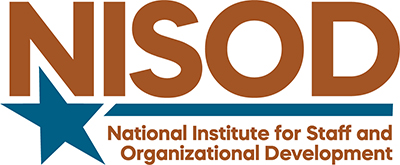
The sessions below are recordings of presentations that took place during NISOD's Online Convenings in October 2020.
Human Cannonballs and Evil Geniuses: Boosting Performance in Online Discussions
Students often struggle in online discussion and feedback forums. Even those who write meaningful and accurate responses to a discussion question find it difficult to leave substantive feedback for their peers. To alleviate these problems and boost performance, learn how to rewrite discussion prompts with a humorous edge and create guided peer replies.
Lea Rosenberry, IT Training Specialist, Penn State University; Tami Tacker, Professor, Mathematics, Purdue University Global
Attention = Retention
Let’s take a closer look at who our virtual students are and where they come from. Participants discuss how changing their approach to virtual students allows them to make better use of the tools available in their LMS to reach more students. Come dive into research to see what the data are telling us!
Christian Garrett, Training Coordinator, Bossier Parish Community College
Because Quality Matters: Roadmap to Online Learner Success
Is your college accessible to online learners? Come hear how San Antonio College walked the Quality Matters Certification Path for Online Learner Support. Learn how a one-year process was developed to ensure student support services were accessible to online learners. Twelve Student and Academic Support Units worked together to create accessibility for online learners. Understand the QM Certification Process and the road to a successful QM application.
Jacob-Aidan Martinez, Director, Student Success; Oralia De Los Reyes, Dean, Student Success, San Antonio College
The Neuroscience of Conversations: Moving From EQ to C-IQ — Building Conversational Intelligence Competencies Inside Your Classroom
As humans, we are wired to connect. One of the most common ways of creating relationships is through our conversations. There is no more powerful skill hardwired into every human than the wisdom of conversations. During our time together, learn about neuroscience communication techniques you can quickly integrate into your classroom settings.
Judith Cardenas, CEO, Strategies By Design
Gamification, Smart Phones, and Brain Science: Increasing Completion for Underprepared Learners in a Free Mobile App
What lessons can mobile-friendly, online gaming and retail design teach higher education about building persistence? How can games help students understand “cognitive load” and learn to shift knowledge into long-term memory? Learn how BPCC’s Mobile App refresher courses, built on cognitive applications for learning, online engagement, and deep-game structure, help power at-risk students toward completion. You’ll learn cognitive, science-based strategies for teaching underprepared students and gain access to BPCC’s free website to take back to your students.
Allison Martin, Director, Institutional Effectiveness Initiatives, Bossier Parish Community College
Another New Paradigm: The MillennialZ and Educational Technology
Millennials are not the younger generation in our classrooms; they’ve been followed by Gen Z students. Students have changed, and so must our classrooms and teaching strategies. Faculty should understand that there are differences between Gen Y and Gen Z students, and that new ways are needed to respond to, communicate with, and motivate Gen Z students. Learn how to engage Gen Z students using free and easy-to-use educational technology tools and gain the ability to create instructional videos and games, study aids, and presentations that increase student motivation and participation, particularly for Gen Z students!
Sean Glassberg, Director, Faculty Development, Horry Georgetown Technical College
Teams, Flow, and SharePoint, Oh My! Using Advanced Office 365 Tools for Student Success
As an Office 365 institution, Blinn College District uses a variety of online tools for student success. Beyond turning in assignments in Word format and presenting in PowerPoint, advanced tools in Office 365 are leveraged for positive outcomes in classrooms, groups, and committees. Explore how Microsoft Teams, SharePoint, and Flow are integrated into the everyday lives of students, staff, and faculty.
John Rice, Instructional Technologist, Blinn College
New Tools to Improve Inclusive Student Engagement and Retention
This presentation demonstrates new and underused technology tools that improve student retention and make the distance classroom inclusive. The goal is to help faculty and course designers use inexpensive technological tools to create an exciting, customized distance classroom setting that helps students master course content.
Kathrynn Hollis-Buchanan, Associate Professor, Business/Accounting, Kodiak College